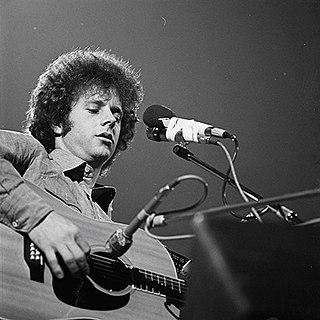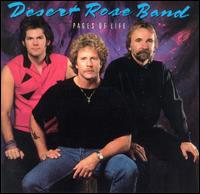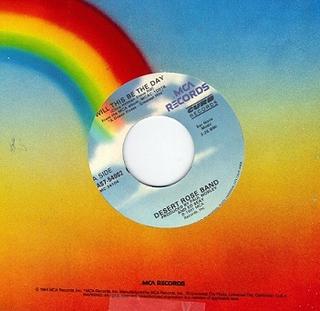
The Flying Burrito Brothers are an American country rock band, best known for their influential 1969 debut album, The Gilded Palace of Sin. Although the group is perhaps best known for its connection to band founders Gram Parsons and Chris Hillman, the group underwent many personnel changes and has existed in various incarnations. Now officially known as The Burrito Brothers the band continues to perform and record new albums.

Christopher Hillman is an American musician. He was the original bassist of the Byrds.

The Desert Rose Band was an American country rock band from Los Angeles, California, founded in 1985 by Chris Hillman, with Herb Pedersen and John Jorgenson. The original lineup included Bill Bryson on bass guitar, JayDee Maness on pedal steel guitar, and Steve Duncan on drums. In the late 1980s and early 1990s, the band charted several hit singles on the US Billboard Hot Country Singles & Tracks charts until disbanding in February 1994.
Desert rose may refer to:

John Richard Jorgenson is an American musician. Although best known for his guitar work with bands such as the Desert Rose Band and The Hellecasters, he is also proficient on the mandolin, mandocello, Dobro, pedal steel guitar, piano, upright bass, clarinet, bassoon, and saxophone. While a member of the Desert Rose Band, he won the Academy of Country Music's "Guitarist of the Year" award three consecutive years.

Herbert Joseph Pedersen is an American musician, guitarist, banjo player, singer-songwriter, and actor who has played a variety of musical styles over the past fifty years including country, bluegrass, progressive bluegrass, folk, folk rock, country rock, and has worked with numerous musicians in many different bands.

"Story of Love" is a song written by Chris Hillman and Steve Hill, and recorded by American country music group The Desert Rose Band. The song was produced by Paul Worley and Ed Seay, and released in July 1990 as the third and final single from the band's third studio album Pages of Life.

The Desert Rose Band is the debut studio album by the American country rock group The Desert Rose Band. It was released June 2, 1987 via MCA/Curb. The album peaked at #24 on the Top Country Albums chart.

Running is the second studio album by American country rock group The Desert Rose Band. It was released September 6, 1988 via MCA/Curb. The album peaked at number 26 on the Top Country Albums chart.

Pages of Life is the third studio album by American country rock group The Desert Rose Band. It was released January 16, 1990, via MCA/Curb, and produced by Paul Worley and Ed Seay.

A Dozen Roses – Greatest Hits is the first compilation album by American country rock group The Desert Rose Band. It was released January 4, 1991, via MCA/Curb. The album peaked at number 44 on the Top Country Albums chart.

"In Another Lifetime" is a song recorded by American country music group The Desert Rose Band. It was released in February 1990 as the second single from the band's third studio album Pages of Life. The song was written by Chris Hillman and Steve Hill, and produced by Paul Worley and Ed Seay.

True Love is the fourth album by the country rock band The Desert Rose Band, released in 1991. The album was released by the Curb record label, failing to make an impact on the American Country charts.

"You Can Go Home" is a song by the American country rock band The Desert Rose Band, which was released in 1991 as the lead single from their fourth studio album True Love. It was written by Chris Hillman and Jack Tempchin, and produced by Tony Brown.

"Will This Be the Day" is a song recorded by American country music group The Desert Rose Band. It was released in January 1991 as the first single from their compilation album A Dozen Roses – Greatest Hits. The song was written by Chris Hillman and Steve Hill, and produced by Ed Seay and Paul Worley.
"What About Love" is a song by American country rock band The Desert Rose Band, which was released in 1993 as the lead single from their fifth and final studio album Life Goes On. The song was written by Chris Hillman and Steve Hill, and produced by Paul Worley and Ed Seay. "What About Love" peaked at No. 71 on the US Billboard Hot Country Singles & Tracks chart.

"Come a Little Closer" is a song by the American country rock band The Desert Rose Band, which was released in 1991 as the second and final single from their first compilation album A Dozen Roses – Greatest Hits. It was written by Chris Hillman and Steve Hill, and produced by Ed Seay and Paul Worley.

"Twilight Is Gone" is a song by the American country rock band The Desert Rose Band, released in 1991 as the second and final single from their fourth studio album True Love. It was written by Chris Hillman and Steve Hill, and produced by Tony Brown.

Chris Hillman is an American musician and songwriter. In addition to his solo albums and his recordings with the Byrds, the Flying Burrito Brothers, and the Desert Rose Band, he has been featured as a collaborator with and composer for many other artists.

JayDee Maness is an American pedal steel guitarist who is a veteran session musician in Los Angeles. He is known for his work with Gram Parsons, the Byrds, Buck Owens and the Buckaroos, Ray Stevens, Vince Gill, and the Desert Rose Band. Maness received The Academy of Country Music's "Steel Guitarist of the Year" award 18 times and was inducted into the Steel Guitar Hall of Fame in 2003.

















